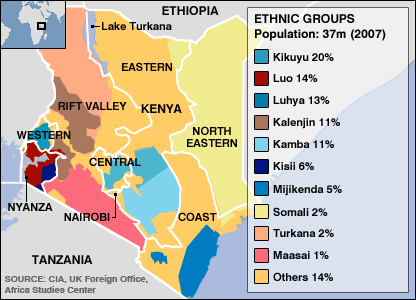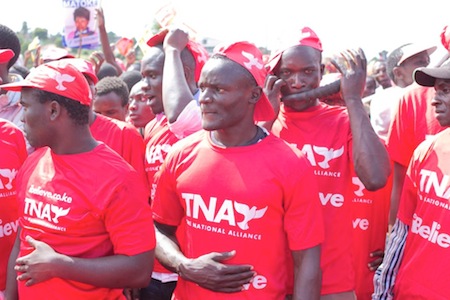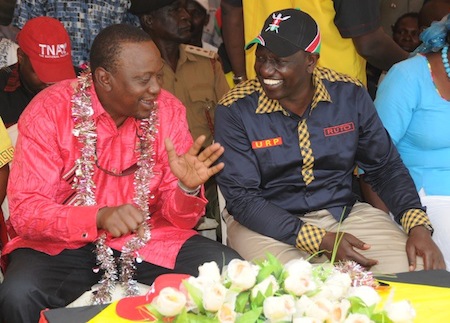To understand what’s going on in Kenya’s politics and to understand the nature of its upcoming March 4 presidential election, you have to understand that Kenyan politics are based on ethnic identity, not ideology.![]()
Due to the nature of Kenyan election rules, a presidential candidate has to build an electoral coalition larger than any single ethnic group in the country — a candidate must win not only a 50% majority of the votes, but 25% of the vote in at least 24 of Kenya’s 47 counties.
So it’s not enough for deputy prime minister and former finance minister Uhuru Kenyatta to win a plurality of the vote based largely on the support of his Kikuyu ethnic group, Kenya’s largest. Nor would it be enough for Kenyan prime minister Raila Odinga to win a plurality on the strength of his own Luo ethnic group.
That means the winning candidate will have to craft a coalition based on many different ethnic groups, and Kenyatta and Odinga have both named running mates of differing ethnic groups. In light of the aftermath of the 2007 election, when incumbent Mwai Kibaki won narrow reelection against Odinga amid charges of rigging the vote count, political riots quickly descended into ethnic violence. But the 2013 elections will also largely be determined on the basis of ethnicity-based coalitions, which only underscores the fear that Kenya could undergo another round of destabilizing political violence.
Identifying Kenya’s ethnic groups
In the broadest terms, Kenya’s ethnic groups can be divided into the Bantu and the Nilotic peoples.
The Bantu comprise by far the largest group of Kenyans, roughly two-thirds of Kenya’s 43 million people. The Bantu ethnic groups derive from people who originally came to Kenya from western and central Africa 2,000 years ago during the so-called Bantu expansion. The Bantu languages are derived from the Niger-Congo language family — you are likely to be most familiar with Swahili, a Bantu language that, along with English, is one of Kenya’s two official languages.
The Nilotic peoples are the second-largest group, comprising about one-third of Kenyans. Unlike the Bantu, they originally came to Kenya from what is today South Sudan, and they are somewhat more rural than their Bantu counterparts. They speak languages derived from the Nilo-Saharan language family, which includes the Dholuo language of Kenya, but also Nubian and other languages throughout Sudan and north-central Africa.
But that only explains so much about Kenya’s incredibly complex range of ethnic groups, which are divided even further on the basis of regional, linguistic and other cultural and historical criteria. Notably, as the useful map below shows, much of Kenya’s population resides in the highlands that stretch from the Rift Valley and along the western border through the central heartland of Kenya.

Accordingly, there are five major ethnic groups and countless others that form a mosaic of politically mobilized chess pieces, any of which can come together to form a political and governing alliance. Alliances are not based on Bantu / Nilotic lines, and from one election to the next, one ethnic group may support a candidate that it virulently opposed in the prior election, making Kenyan politics incredibly unique — and also difficult to understand.
As recently as 2005, Odinga and Kenyatta found themselves on the same side, politically, in opposition to a constitutional referendum
The five largest groups are as follows:
- The Kikuyu, a Bantu group, comprise 17% of the population (according to the 2009 census) that, as the map shows, reside largely in the central highlands of Kenya around Mount Kenya north of Nairobi.
- The Luhya, also a Bantu group, comprise 14% of the population and reside in the highlands of Western Province, along the Ugandan border just north of Lake Victoria.
- The Kalenjin, a Nilotic group, comprise 13% of the population and reside in the Rift Valley highlands and are perhaps best known for producing some of the Kenya’s best runners, who routinely rank among the fastest in the world.
- The Luo, a Nilotic group, comprise 10% of the population and reside in the highlands of Nyanza province, adjacent to Lake Victoria, bordering both Uganda and Tanzania — Barack Obama, Sr., the father of the current U.S. president, was from the Luo ethnic group.
- The Kamba, another Bantu group, comprise 10% of the population and reside in the area east of Nairobi, where the highlands begin to level off into Kenya’s lowlands.
Continue reading Making sense of Kenya’s ethnopolitical alliances

